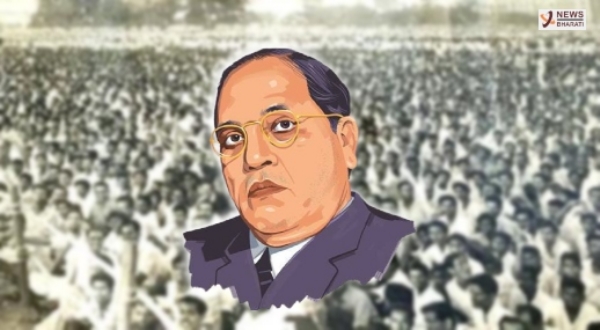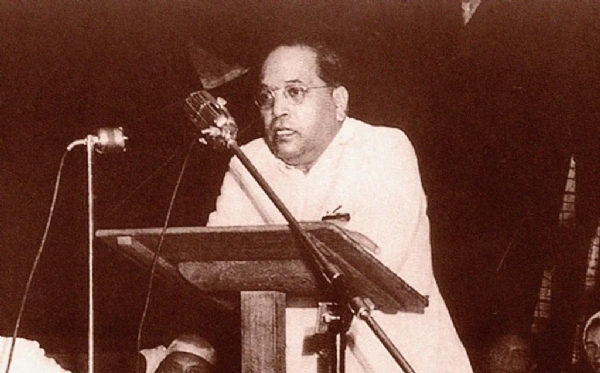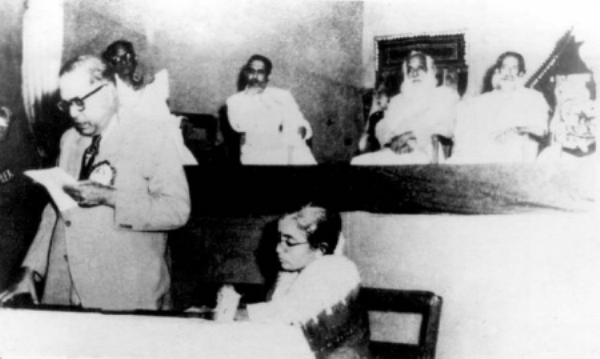Dr. Ambedkar: Gem of Indian polity and governance India failed to explore
There are not many nations in the world that are destined to witness the leadership of such visionary gems like Dr Ambedkar.
Total Views |
Bharat Ratna Dr. Babasaheb Ambedkar is known as the Messiah of the Depressed Classes in India because of his pivotal work for the upliftment of the depressed section of the society. But Dr. Ambedkar means more than just that for India. There is an entire spectrum of his work which has remained overshadowed because of him being associated to a particular section of the society.

Babasaheb viewed the Indian society unfragmented which is why his work for the upliftment of the depressed classes was a repair he sought to implement to the united Indian society with its share of diversity, that had to be accepted and understood to its very depths. Something Babasaheb was able to do and leave a legacy behind. In this article, let us try to explore the neglected chapters of Dr Ambedkar's life that he had dedicated to the country.
Foreign Policy
Babasaheb came from a military background from both, his maternal as well as paternal sides. He, thus, had strong views on India's foreign policy. Dr. BR Ambedkar's insights on India's Foreign policy were neglected by India's first PM Pandit Nehru. However, his advice on India's foreign policy if was taken into consideration then there are chances that India would have taken off on 'Pragati path' long ago.
As concluded in one of the papers published in the 'Journal of Positive School Psychology' (Vol. 6, 2022), "Dr. Ambedkar was the only important Indian politician to oppose the Nehruvian pro-Eastern bloc foreign policy during the early independence days. He argued that India should work along with the democratic West to fortify its position in the new world. It was only after the Indo-Sino skirmishes in late 1950s, Nehru’s policy came under scanner and criticism by other politicians and media."
According to a report from the New York Times, "Though he admired the Western liberalism, he had developed many apprehensions and prejudices on the Western democracy and capitalism. He had extended his hand for friendship to Communist World, like Russia and China. It automatically made Nehru and his India, a foe of the United States led Western World."
Economist
Dr Babasaheb Ambedkar's career is spread over a vast canvas and economics is one of its major aspect. He had pursued his PhD in Economics from Columbia University. He was the first Indian conferred with 'Doctorate in Science' from London School of Economics. Dr Ambedkar as an Economist presented the guidelines for establishment of RBI in 1935. His book, 'The Problem of Rupee: Its Origin and Solution' was the maiden attempt to record the entire history of the Indian rupee. The book was his first ever well researched book that argued and proved how British policies were making Indians poor.

Dr Ambedkar also advocated demonetization in every 10 years. He believed, "If any country has to eliminate black money and fake currency, then after every 10 years country's currency should be demonetized." As per the reports of the Indian Express, "Dr Bhimrao Ramji Ambedkar was among the first political leaders and unsung economists of the country who had recommended that the Indian currency should be changed every 10 years to tackle the problems of hoarding to black money to inflation. But, he had underlined the need for adopting a flawless methodology to ensure the currency change serves the real objective to nab those dodging the system and help the common man."
His role in ending the Khoti system is pivotal. In one of his speeches at Ratnagiri's Chiplun, Dr. Ambedkar said, "He had now come to believe that the purpose of his life was to struggle for the welfare of the downtrodden. He said that he came of a poor family and had lived among the poor in an Improvement Trust Chawl in Bombay. I know your grievances.” Dr. Ambedkar continued, “ the Khoti system is sucking your blood. This system of land tenure must be abolished. Its abolition will bring you peace and progress. In order to achieve your goal you must keep the agitation going on. India is likely to attain full control of its destinies in the coming four or five years. At that time you must take particular care to send to the Legislatures the right type of men as your representatives who would devoutly struggle for the abolition of this Khoti system.”
Labour Leader
Dr Ambedkar deserves to be credited as the pioneer of labour rights in India. However, like every other aspect, even this aspect of Babasaheb's personality remains hidden. As the member for labour in the Viceroy’s council, between 1942 to 1946, his was instrumental in bringing about several labour reforms. One of his biggest contributions that every working person in India should be thanking him for, even today, is that he changed the working hours from 12 hours to 8 hours, during the 7th session of Indian Labour Conference, New Delhi, November 1942.
Besides, he also introduced several measures for workers like dearness allowance, leave benefit, employee insurance, medical leave, equal pay for equal work, minimum wages and periodic revision of scale of pay. He has a significant role to play for strengthening trade unions and establishing 'Employment Exchanges' across India. About the same, he had noted that "I want all people to be Indians first, Indian last and nothing else but Indians."
The Parliamentarian
Even after being elected for the Legislative Council, Babasaheb did so much more than merely for a particular section of the society, but for the society as a whole and more importantly for the nation. Ambedkar has always recommended Parliamentary form of Government, right from the inception of the Government of India Act of 1935. He firmly believed that Parliamentary system of government alone can guide an egalitarian society through the application of Principles of Social democracy.
This thought of Dr Ambedkar about the Principles of Parliamentary democracy is reflected in the Preamble of the Indian Constitution. He always has been a supporter of the fedrel form of government. He said, "The draft Constitution is federal constitution in as much as it establishes what may be called Dual Polity. This Dual Polity under the proposed Constitution will consist of the union at the centre and the states at the Periphery each endowed with sovereign powers to be exercised in the field assigned to them respectively by the Constitution."
Above all, Ambedkar’s contribution to the Indian Constitution stands top most if there had to be a hierarchy of his work. But considering the boundless service he has done for the nation, doing that will be disrespectful. But the volume of effort he has put in the Indian Constitution explains why he is rightfully called 'the Father of the Indian Constitution.'

Dr Ambedkar was a visionary and was living much ahead of what the rest of the country was living. He therefore had already suggested solutions to problems that presumably would surface for India in the near future. He had advised small sized states for the ease of administration. On the same lines, Dr Ambedkar had suggested the division of Bihar and Madhya Pradesh much before Jharkhand split out of Bihar and Chhattisgarh out of Madhya Pradesh, that happened in the year 2000.
Babasaheb envisioned India's national policy for water and electricity. Understanding the significance of irrigation projects for an agrarian country like India, he established the Central Water Commission to facilitate the development of irrigation projects at both the central and the state level. He also established the Central Technical Power Board and Central Electricity Authority.
There are not many nations in the world that are destined to witness the leadership of such visionary gems like Dr Ambedkar. It is high time for the nation to get rid of the glares that have kept the extraordinary work of Dr Ambedkar restricted to a political agenda. India needs to explore this gem of Indian politics, which will be the true respect paid to Babasaheb.
--


